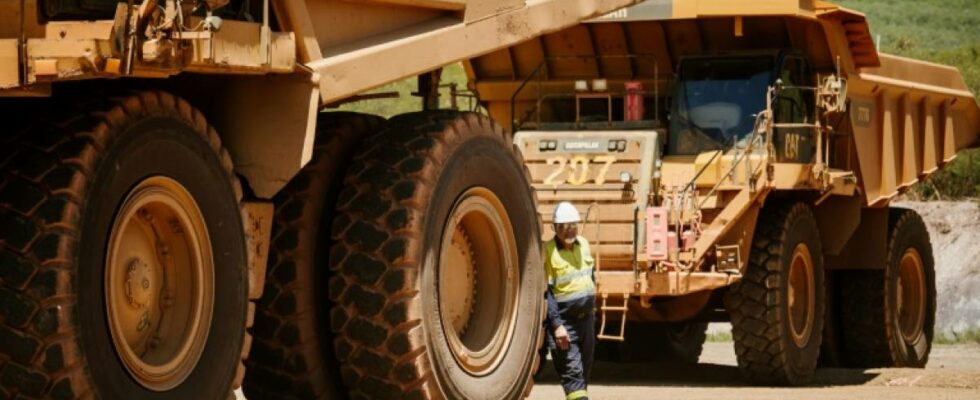The Vavouto site of Koniambo Nickel SAS (KNS), in northern New Caledonia, February 28, 2024 (Delphine Mayeur / AFP / Delphine Mayeur)
The heart of the industrial site of the Koniambo Nickel SAS (KNS) factory, in the north of New Caledonia, is now beating in slow motion. On February 19, at 7:30 p.m., the two furnaces delivered their last pour of molten metal. With the hope that activity will resume soon with a new investor.
The “hot” shutdown of the installations, that is to say keeping the ovens in working order, must last six months. Beyond that, they will be put out of service and the 1,300 employees of the factory will find themselves out of work.
A disaster for the region, entirely transformed by the opening at the turn of the 2010s of this nickel production factory.
The three municipalities close to the factory now have more than 4,000 companies, compared to 2,500 in 2005, and the economic benefits are enormous: five billion euros since 2005, estimates the North province, an independent community holding 51% of KNS in through the South Pacific Mining Company (SMSP) alongside the Anglo-Swiss giant Glencore.
The population increased by around 40% between 2009 and 2019.
But in the context of the global nickel crisis, Glencore announced on February 12 the end of financing for the site, which has already cost it nine billion euros and accumulated 13 billion euros in debt.
The combination of poor yields, expensive energy and strong foreign competition have plunged the three metallurgical plants processing nickel extracted on the French Pacific archipelago, which represents almost all of its nickel exports, into the red. and almost a quarter of private employment.
At the KNS factory, although all jobs will be maintained for six months, the atmosphere is bitter.
“We had the best production start in our history in 2024, and by the end of 2023 we had reached our objective of 3,000 tonnes of monthly production”, underlines Neil Meadows, CEO of KNS.
“Our business plan suggests profitability in 2027”, following the two major maintenances planned for 2025 and 2026, he underlines.
Neil Meadows assures that “four groups have shown interest in the site in recent months” and says he hopes to convince a buyer within six months.
– “Dominoes” –
But to achieve this, “the State would have to guarantee to the future shareholder the offer it made to Glencore”, continues Neal Meadows. Or a loan of 110 million euros and a direct subsidy on energy.
While the three Caledonian nickel factories of “Caillou” (KNS, SLN and Prony Ressources) are in a critical situation, the French government is in fact negotiating a “nickel pact” supposed to perpetuate the sector.
“The nickel pact must succeed,” insists Neil Meadows while ensuring that it was not the refusal of the Northern province to open the metallurgical reserves to exports which weighed in Glencore’s decision to leave. Because he is sure, “if KNS falls, it will be the first of the dominoes” and the other metallurgical operators in the archipelago will follow.
However, he does not dare imagine a New Caledonia without nickel factories. A position which distinguishes him from Christel Bories, director of the French giant Eramet (majority shareholder of SLN) who, in the Financial Times, predicted this week the end of metallurgy in favor of exports of raw nickel alone.
“We believe in our project,” replies Neil Meadows.
So to be ready, all KNS staff got into working order. Like the factory, the mine has stopped operating and the Serpentine, this gigantic conveyor belt which carries the ore extracted from the mountain, is now silent.
The trucks, sprinklers and screeners have been brought down and employees are concentrating on cleaning the site. They will then be offered training, “just to stay in a good dynamic”, explains Jean-Christophe Ponga, the superintendent of mining operations.
“We have experienced other difficulties since the start of the project. Even if here, the issue is particularly serious, they are motivated,” he continues.
At the factory after the last casting of metal, the temperature of the furnaces is slowly lowered.
In use, high temperatures cause them to expand: it is therefore necessary to control the cooling so that they retract without being damaged. A procedure known to the teams, since it is implemented during major maintenance which requires stopping production.
In a week, the ovens will be asleep. But unlike cold ovens, which require long months of reconstruction, “they are hot, therefore alive”, explains Aurélien Archambeault, the director of the factory.
Ready to get back to life as soon as possible.
